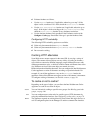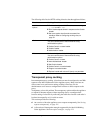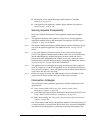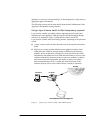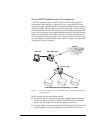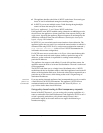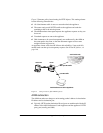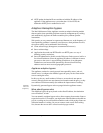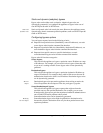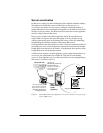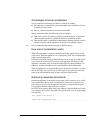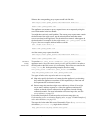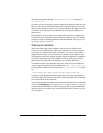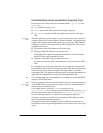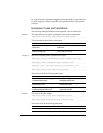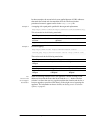
Appendix A Caching Solutions and Performance 127
Static and dynamic (adaptive) bypass
Bypass rules can be either static or adaptive. Adaptive bypass rules are
dynamically generated if you configure the appliance to bypass in the case of
non-HTTP port 80 traffic or HTTP errors.
Static and
dynamic rules
Static and dynamic rules look exactly the same. However, the appliance creates
dynamic rules when it encounters particular problems, such as non-HTTP port 80
traffic or HTTP errors.
Configuring bypass options
You can bypass requests based on the following criteria:
✔ Requests from particular users (identified by source IP addresses); set static
source bypass rules from the command-line interface
✔ Requests to particular Web sites (identified by destination IP addresses); set
static destination bypass rules from the command-line interface
✔ Requests from specific sources to specific destinations; set static
source/destination bypass rules from the command-line interface
Bypass rules fall into these categories:
Source bypass:
This rule tells the appliance to bypass a particular source IP address or range
of IP addresses. For example, you can use this rule to bypass clients that want
to opt out of a caching solution. Source bypass rules are not dynamically
generated.
Destination bypass:
This rule tells the appliance to bypass a particular destination IP address or
range of IP addresses. For example, these could be Web servers that use IP
authentication based on the client’s real IP address. Destination bypass rules
can be dynamically generated.
Hit-rate
impact
Destination bypass rules prevent the appliance from caching an entire site.
You will experience hit rate impacts if the site you bypass is popular.
Source/destination pair bypass:
This rule tells the appliance to bypass requests that originate from the
specified source to the specified destination. For example, you can route
around specific client-server pairs that experience broken IP authentication or
out-of-band HTTP traffic problems when cached.
Source/destination rules can be dynamically generated.
Reducing
hit-rate impact
Source/destination bypass rules might be preferable to destination rules
because they block a destination server only for those particular users that
experience problems.



